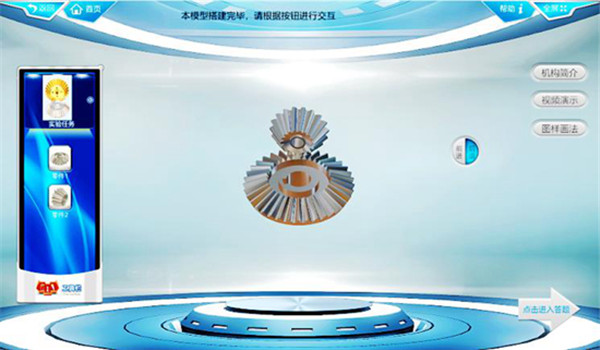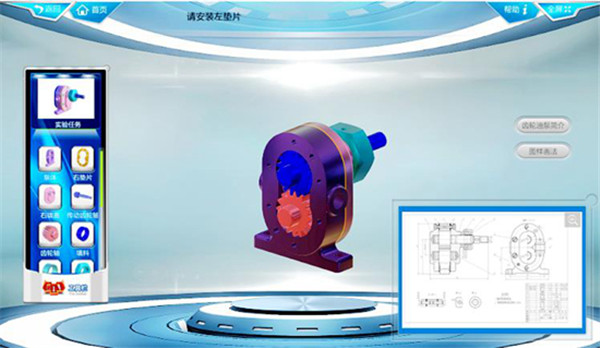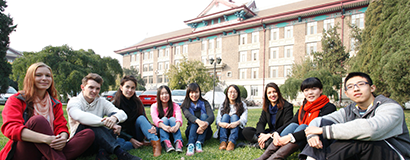During the Covid-19 epidemic, Tianjin University’s virtual engineering graphics laboratory is hustling and bustling in the mechanical engineering teaching practice center: over 100 students are "experiencing" the practice course of "Engineering Graphics" in front of the test bed.

While observing the mechanical structure and its principle, the students disassemble and assemble the oil pump gears. It is the virtual simulation technology that creates the teaching building and gear components. Students can complete a series of experiments online at home.

During the epidemic, teachers and students of Tianjin University are innovating online teaching and experimental teaching methods through virtual simulation technology, so as to help students "keep on experimenting and learning".
Known as the "golden course", virtual simulation experimental teaching can generate a lifelike "simulation laboratory" with multiple senses relying on virtual reality technology (computer technology). Teachers and students can complete complex experiments in 3D space, participate in dangerous and destructive experiments which are difficult to achieve in the actual laboratory, so as to improve teaching effectiveness. Now, this technology has become the key to solving the difficult problem facing engineering students: completing experiments during the epidemic.
As a pioneer in the “Emerging Engineering” Education in national universities, Tianjin University has carried out virtual simulation teaching projects in its most schools, including 20 municipal and 5 national projects. Today, four "golden courses" of Tianjin University have been selected for the national virtual simulation experiment teaching project, ranking the top in China.
Xu Jian, a teacher of Engineering Graphics in Tianjin University, said, “Engineering Graphics is a compulsory course for engineering students, and it has been chosen by thousands of students since the epidemic. No matter where students are, now they can complete the specified teaching tasks by operating online experimental equipment.”
"Virtual simulation technology has brought incredible changes to the classroom." Xu Jian found that this new teaching mode is also stimulating students' creativity and learning interest.
The virtual simulation classes can flesh out all the abstract knowledge points. In this way, the components and instruments in the book are all "alive", and can be "played" by students in all aspects. Moreover, the class schedule and class test have become small competitions like "playing game".
Some imaginative students will easily assemble the virtual parts into a decent "barbecue robot" and show it off in Wechat’s Circle of Friends.
The Inclusive Accessibility Design Research Center of Tianjin University is opening a magic door. After logging in to the PC teaching platform, you will immediately enter a bustling virtual city. According to the "rules of the game", students should design guidance signs for the elderly, children and disabled people from the "first perspective", and analyze affinity and eye appeal degrees of patterns, colors and scales through comparison in lifelike life scenes.
"You can't lead all the students to a hospital or a nursing home just for one knowledge point," said Zhao Wei, one of the leading teachers of Virtual Simulation Experiments of Inclusive Accessibility Design, "In the past, in order to make students understand the key design elements, we needed to buy a lot of equipment to simulate human disabilities in different environments, but virtual simulation technology has largely overcome the difficulties in traditional teaching methods." he added.
Lin Yuchen, an undergraduate of School of Architecture admitted in 2017 at Tianjin University, found these abstract knowledge points and data seemed to be concrete in the process of experience.
At the beginning of March, the School of Chemical Engineering and Technology of Tianjin University opened the teaching resources of virtual simulation experiments such as "Principles of Chemical Engineering" to the public for free. All Students can log in to the platform and "conduct experiments" at home through the teaching resources.
"We have opened our ‘golden courses’, which are also the "hard courses" to national colleges and universities, including the first batch of national virtual simulation experiment teaching projects, as well as the first national virtual simulation experiment teaching project of chemical industry in Tianjin." According to the person in charge of School of Chemical Engineering and Technology of Tianjin University, students can complete all the operation experiments of chemical engineering principle units online and experience the operations that are difficult to realize in the actual laboratory, such as disposal of toxic, harmful, flammable and explosive substances.
"As the focus of the experiment curriculum reform, virtual simulation experiment teaching project is becoming a best weapon in “New Engineering” Education and “Double First-class" Strategy. Gong Jinlong, Vice President of Tianjin University, said that “We should build an information-based experimental teaching system with full coverage of majors, excellent teaching effect, openness efficiency and sharing. What’s more, we need strive to work with national colleges to jointly promote the new mode of‘intelligence + education’".
By: Zhao Jiabing
Editors: Keith Harrington, Sun Xiaofang






